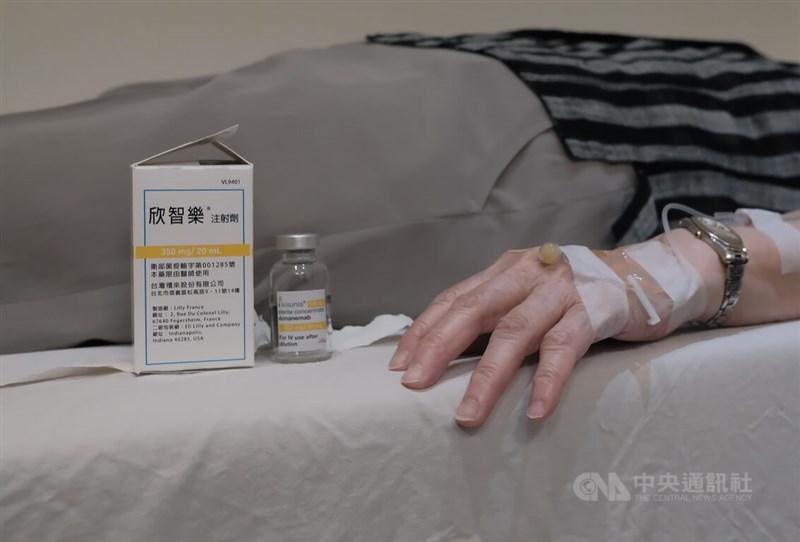Kisunla, a newly approved Alzheimer's drug in Taiwan, would not be covered by the National Health Insurance (NHI) system, while coverage for Leqembi, another Alzheimer's treatment approved this year, is still under review, a health official overseeing the NHI system said yesterday.
Kisunla has already been reviewed by an expert panel, which concluded that although the drug has completed Phase 3 clinical trials, the follow-up period for users was too short and its long-term benefits remain unclear, National Health Insurance Administration Director-General Shih Chung-liang (石崇良) said in a legislative session.
Given the drug's high cost and references to health technology agencies in the UK, Australia and Canada — none of which recommended it for coverage by public health insurance — the panel decided against recommending it for inclusion in the NHI system, Shih said.

Photo: CNA file photo
As for Leqembi, Shih said its application for NHI coverage was submitted last month and is currently under review.
The drug is to undergo a 45-day Health Technology Assessment (HTA) before being reviewed by an expert panel, with a decision expected early next year, he added.
Jointly developed by Eisai in Japan, Biogen in the US and BioArctic in Sweden, Leqmebi was approved by the US Food and Drug Administration in July 2023, while Kisunla, developed by US pharmaceutical company Eli Lilly, received a green light in July last year.
The two medications received approval from Food and Drug Administration earlier this year, but have not been covered by the NHI system, requiring patients to pay out of pocket for treatments that cost more than NT$1 million (US$33,398) per year.
An estimated 350,000 people in Taiwan have some form of dementia, 60 to 70 percent of whom have Alzheimer's disease, said Yan Sui-hing (甄瑞興), director of Far Eastern Memorial Hospital's dementia center.
Yan said about half of those with Alzheimer's may be eligible for the two new treatments, which target patients in the early stages of the disease, totaling fewer than 100,000 people.
Unlike previous medications, Kisunla and Leqembi are the first new treatments for Alzheimer's disease that target the underlying cause rather than just its symptoms, according to hospital, which administered the first dose of Kisunla in Taiwan on June 23.
In terms of expected outcomes, the complete elimination of amyloid plaques — which many researchers believe to be a key cause of Alzheimer's disease due to their abnormal accumulation in the brain — was seen in nearly 70 percent of patients within a year of receiving the two drugs, according to New Taipei Municipal Tucheng Hospital, one of the first hospitals in Taiwan to offer Leqembi.
Leqembi has the potential to slow the progression of Alzheimer's disease by 27 percent to 51 percent, while patients receiving Kisunla may see a 29 to 36 percent reduction in disease progression, the Tucheng Hospital added.

The Coast Guard Administration (CGA) yesterday said it had deployed patrol vessels to expel a China Coast Guard ship and a Chinese fishing boat near Pratas Island (Dongsha Island, 東沙群島) in the South China Sea. The China Coast Guard vessel was 28 nautical miles (52km) northeast of Pratas at 6:15am on Thursday, approaching the island’s restricted waters, which extend 24 nautical miles from its shoreline, the CGA’s Dongsha-Nansha Branch said in a statement. The Tainan, a 2,000-tonne cutter, was deployed by the CGA to shadow the Chinese ship, which left the area at 2:39pm on Friday, the statement said. At 6:31pm on Friday,

The Chinese People’s Liberation Army Navy’s (PLAN) third aircraft carrier, the Fujian, would pose a steep challenge to Taiwan’s ability to defend itself against a full-scale invasion, a defense expert said yesterday. Institute of National Defense and Security Research analyst Chieh Chung (揭仲) made the comment hours after the PLAN confirmed the carrier recently passed through the Taiwan Strait to conduct “scientific research tests and training missions” in the South China Sea. China has two carriers in operation — the Liaoning and the Shandong — with the Fujian undergoing sea trials. Although the PLAN needs time to train the Fujian’s air wing and

The American Institute in Taiwan (AIT) put Taiwan in danger, Ma Ying-jeou Foundation director Hsiao Hsu-tsen (蕭旭岑) said yesterday, hours after the de facto US embassy said that Beijing had misinterpreted World War II-era documents to isolate Taiwan. The AIT’s comments harmed the Republic of China’s (ROC) national interests and contradicted a part of the “six assurances” stipulating that the US would not change its official position on Taiwan’s sovereignty, Hsiao said. The “six assurances,” which were given by then-US president Ronald Reagan to Taiwan in 1982, say that Washington would not set a date for ending arm sales to Taiwan, consult

A Taiwanese academic yesterday said that Chinese Ambassador to Denmark Wang Xuefeng (王雪峰) disrespected Denmark and Japan when he earlier this year allegedly asked Japan’s embassy to make Taiwan’s representatives leave an event in Copenhagen. The Danish-language Berlingske on Sunday reported the incident in an article with the headline “The emperor’s birthday ended in drama in Copenhagen: More conflict may be on the way between Denmark and China.” It said that on Feb. 26, the Japanese embassy in Denmark held an event for Japanese Emperor Naruhito’s birthday, with about 200 guests in attendance, including representatives from Taiwan. After addressing the Japanese hosts, Wang